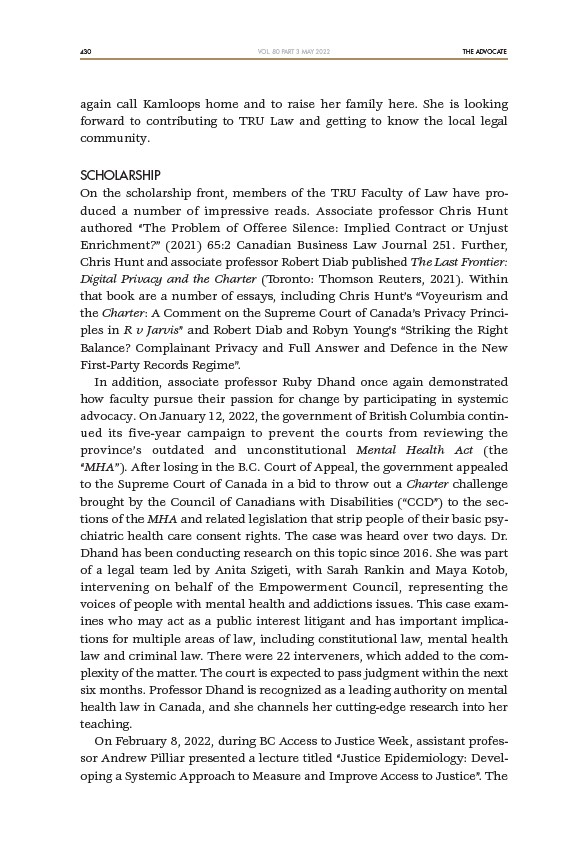
430 THE ADVOCATE
VOL. 80 PART 3 MAY 2022
again call Kamloops home and to raise her family here. She is looking
forward to contributing to TRU Law and getting to know the local legal
community.
SCHOLARSHIP
On the scholarship front, members of the TRU Faculty of Law have produced
a number of impressive reads. Associate professor Chris Hunt
authored “The Problem of Offeree Silence: Implied Contract or Unjust
Enrichment?” (2021) 65:2 Canadian Business Law Journal 251. Further,
Chris Hunt and associate professor Robert Diab published The Last Frontier:
Digital Privacy and the Charter (Toronto: Thomson Reuters, 2021). Within
that book are a number of essays, including Chris Hunt’s “Voyeurism and
the Charter: A Comment on the Supreme Court of Canada’s Privacy Principles
in R v Jarvis” and Robert Diab and Robyn Young’s “Striking the Right
Balance? Complainant Privacy and Full Answer and Defence in the New
First-Party Records Regime”.
In addition, associate professor Ruby Dhand once again demonstrated
how faculty pursue their passion for change by participating in systemic
advocacy. On January 12, 2022, the government of British Columbia continued
its five-year campaign to prevent the courts from reviewing the
province’s outdated and unconstitutional Mental Health Act (the
“MHA”). After losing in the B.C. Court of Appeal, the government appealed
to the Supreme Court of Canada in a bid to throw out a Charter challenge
brought by the Council of Canadians with Disabilities (“CCD”) to the sections
of the MHA and related legislation that strip people of their basic psychiatric
health care consent rights. The case was heard over two days. Dr.
Dhand has been conducting research on this topic since 2016. She was part
of a legal team led by Anita Szigeti, with Sarah Rankin and Maya Kotob,
intervening on behalf of the Empowerment Council, representing the
voices of people with mental health and addictions issues. This case examines
who may act as a public interest litigant and has important implications
for multiple areas of law, including constitutional law, mental health
law and criminal law. There were 22 interveners, which added to the complexity
of the matter. The court is expected to pass judgment within the next
six months. Professor Dhand is recognized as a leading authority on mental
health law in Canada, and she channels her cutting-edge research into her
teaching.
On February 8, 2022, during BC Access to Justice Week, assistant professor
Andrew Pilliar presented a lecture titled “Justice Epidemiology: Developing
a Systemic Approach to Measure and Improve Access to Justice”. The